An artistic turn
Lea Weingarten sheds her Enron past for a career in the art world
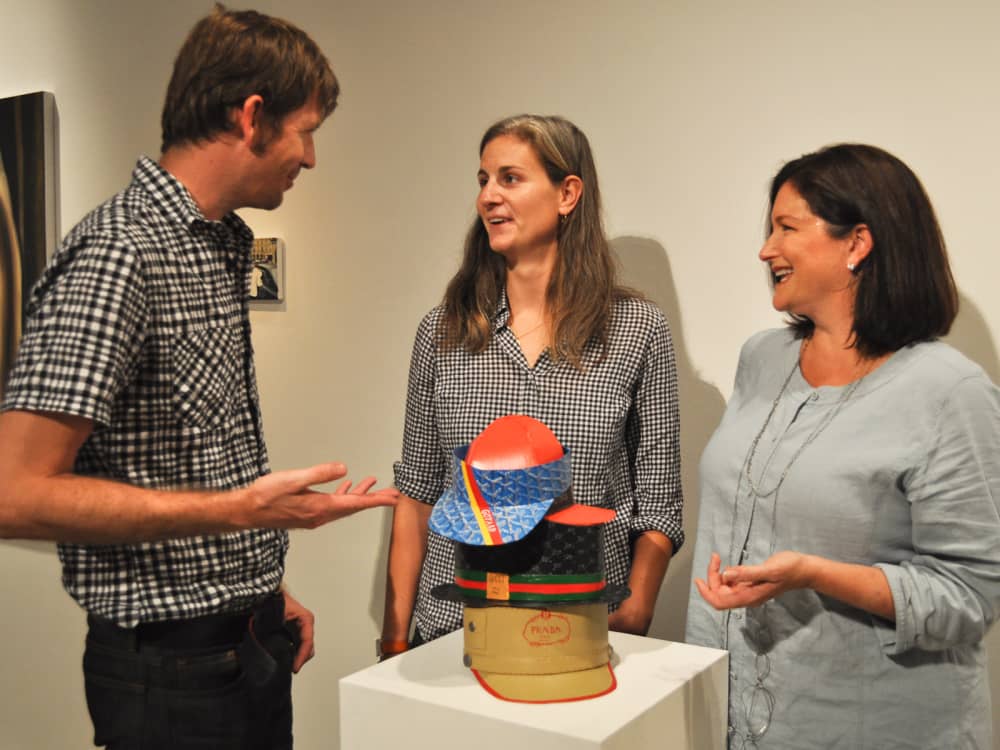 Peel Gallery owner Stephen Hempel, from left, shared a moment with Californiaartist Libby Black and curator Lea Weingarten at the exhibition press preview.Photo by Shelby Hodge
Peel Gallery owner Stephen Hempel, from left, shared a moment with Californiaartist Libby Black and curator Lea Weingarten at the exhibition press preview.Photo by Shelby Hodge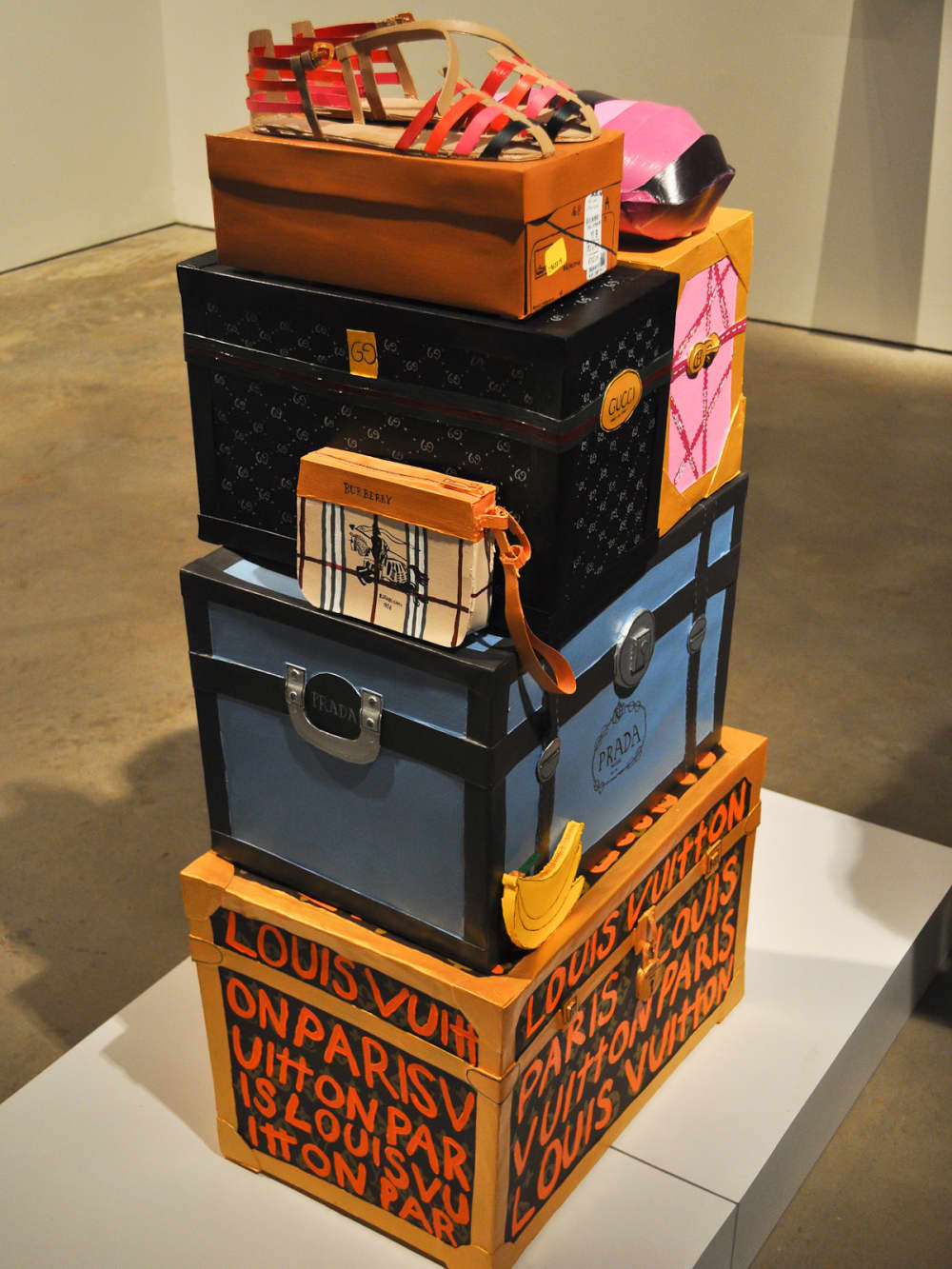 A whimsical "designer" collection of travel trunks, bags and sandals is focalpoint in Peel Gallery.Photo by Shelby Hodge
A whimsical "designer" collection of travel trunks, bags and sandals is focalpoint in Peel Gallery.Photo by Shelby Hodge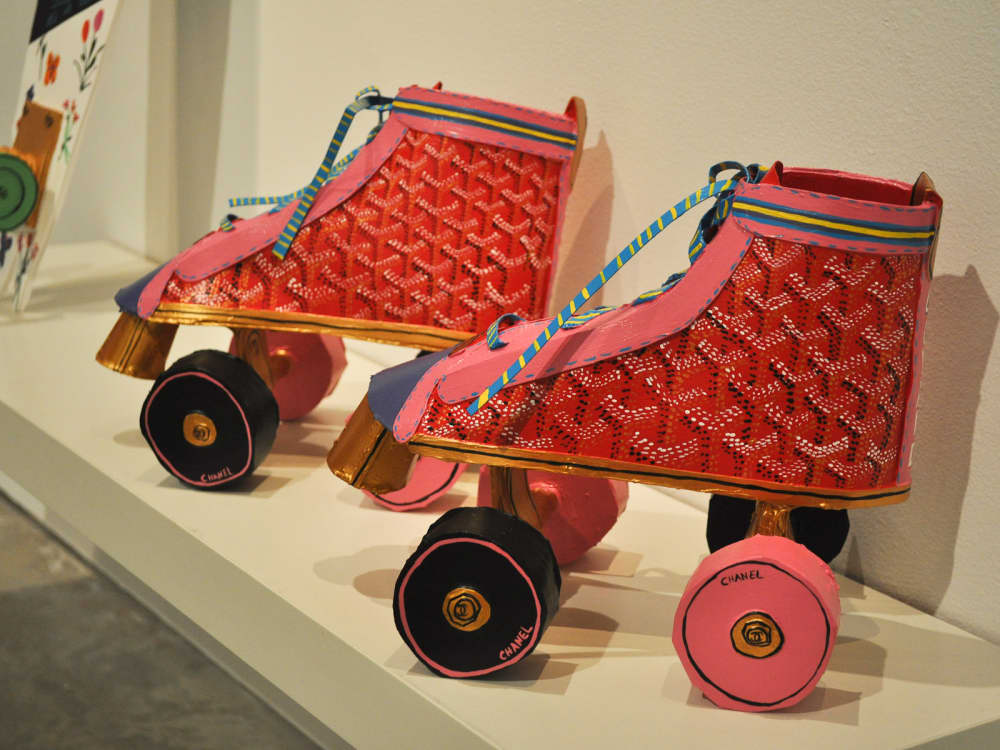 Designer roller skates — a must have for dedicated fashionistas.Photo by Shelby Hodge
Designer roller skates — a must have for dedicated fashionistas.Photo by Shelby Hodge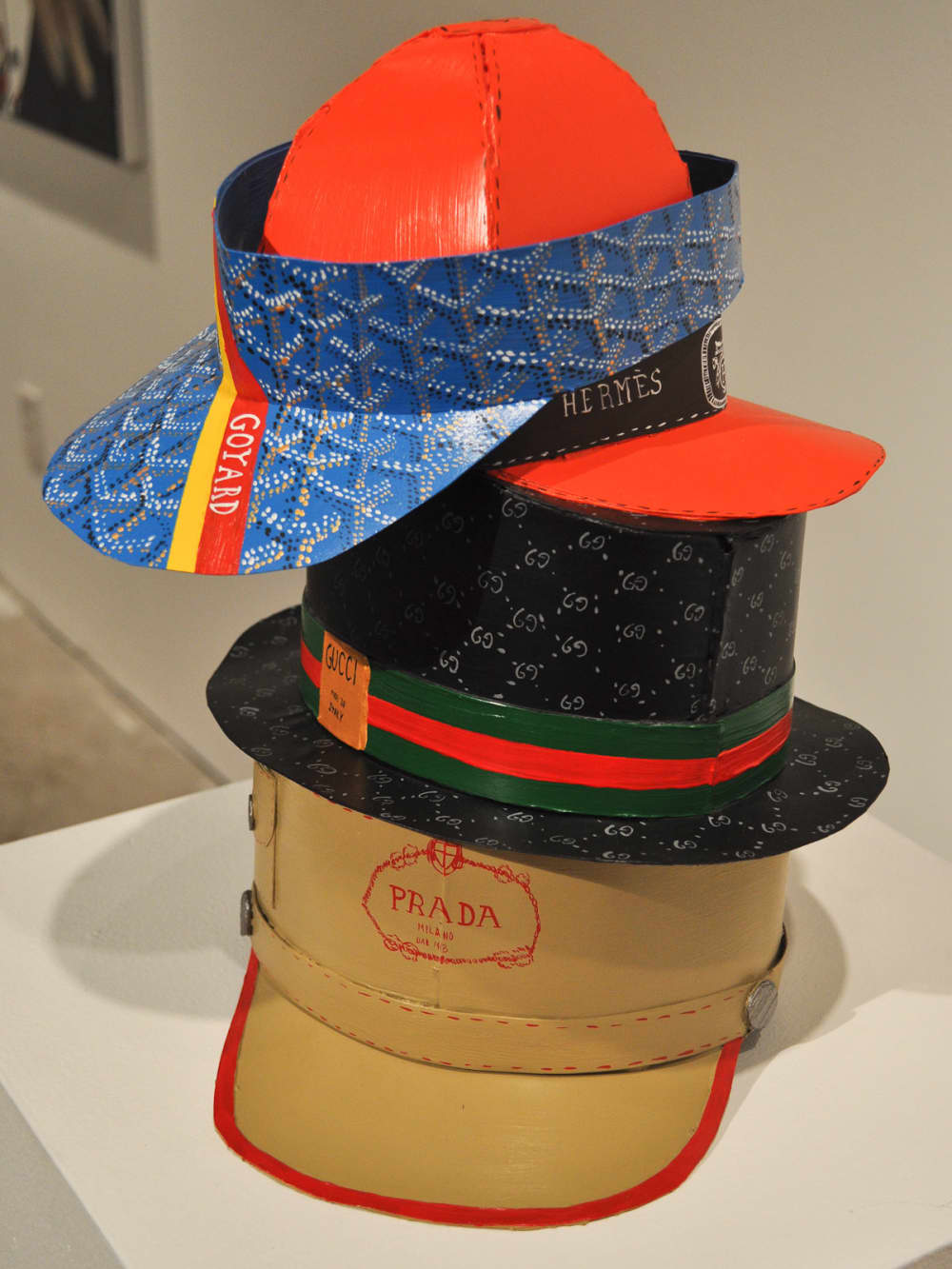 Labels are the thing in Libby Black's totem of designer hats.Photo by Shelby Hodge
Labels are the thing in Libby Black's totem of designer hats.Photo by Shelby Hodge
With the opening reception for artist Libby Black's exhibition at Peel Gallery on Friday night, art aficionados will find added interest beyond the Californian's creative take on materialism.
If Nothing Else Matters was curated by Lea Weingarten, the wife of former Enron CFO Andrew Fastow. While Weingarten has been running her art consulting firm, Contemporary Connoisseurs, for several years, this is only her second public curatorial work. (Last November, she joined forces with José Solis and Peel owner Stephen Hempel in curating an exhibition titled PAPERcut.)
At Tuesday's press preview, Weingarten congenially welcomed an intimate group of friends and art media, introducing Black and discussing the artist's take on the "mechanics of desire, access and privilege." The sophisticated art world milieu, where on this night prosecco and caviar were served, is far removed from the point where Weingarten began her journey back from the Enron debacle.
Her husband, considered the mastermind behind the financial schemes that brought Enron down, remains in federal prison with release scheduled for 2012.
After spending a year in federal detention herself for tax fraud related to the Enron collapse, Weingarten, former Enron assistant treasurer, has kept a low profile, slowly building her art consulting business.
"I've been up and running for about four years as a company. But I just fly under the radar," she explained in an interview with CultureMap. "I'm not interested in a lot of attention because I really believe that the only way people really get to know you is by dealing with you directly."
Shortly after her release from prison, Weingarten enrolled in nursing school but her long-time interest in art prevailed.
"You go through a lot of soul searching in figuring out what you want to do and I was intrigued and still am intrigued by the medical field," she said. "But I decided that for all intents and purposes, as a single mom at this time in my life, this was going to work best. And I didn't find that I had the same passion for nursing as I did for art. I really discovered my passion in my 40s and that was for art."
In the early '90s, Weingarten was asked to fill Enron's seat on the board of the Contemporary Arts Museum. "It was like a light bulb went on," she said, recalling the exhilaration of connecting with the art world. She fully embraced this sphere that had been an integral part of her upbringing by parents who were collectors, although their focus was more traditional.
As her interest grew, Weingarten was tapped to head Enron's art acquisition committee, which included notables such as Menil Collection director Ned Rifkin and Museum of Fine Arts, Houston curator Barry Walker. They had a hefty budget for filling out the Enron collection, but their mission was never completed due to the company's collapse. The acquired works, less than a dozen, were eventually sold.
Serving on the CAM board at that time with Weingarten was well-known collector Jeanne Klein. They became fast friends. Both were involved in the Menil Collection. Soon, Dominique de Menil asked the two women to organize the Menil Contemporaries, one of the early young professional groups focusing on art. These were heady days when Klein would host world-renowned artists, such as Jeff Koons, as guest lecturers for Menil Contemporaries programs. The two women remain close friends.
Today, Weingarten relishes her work as an art advisor and independent curator. She began small with just two clients, advising friends on their collections. Her client roster has grown to include educational institutions, companies and interior designers. She has selected art for such diverse projects as a house in Santa Fe, N.M., and a home in Scotland.
As with any savvy art advisor, Weingarten attends the various art fairs including those in New York, Miami, London and Chicago and she conducts collector tours for clients. Her focus is primarily contemporary art with some interest in post modern.
Even with the success of her company which is finally turning a livable profit, Weingarten says, "You're as good as your children are doing and my boys are doing pretty well right now." Both, aged 11 and 15, are students at St. John's.
Although still married, Weingarten dropped her married name a few years ago. "I decided to do it when I realized that the name Fastow doesn't completely describe me. I'm not the sum total of that name," she said. "And everyone knows who I am even though I go by the name Weingarten. But in terms of taking me for what I am, I always start out meetings with new clients by saying 'If you have any questions, I'm more than happy to answer them.' "

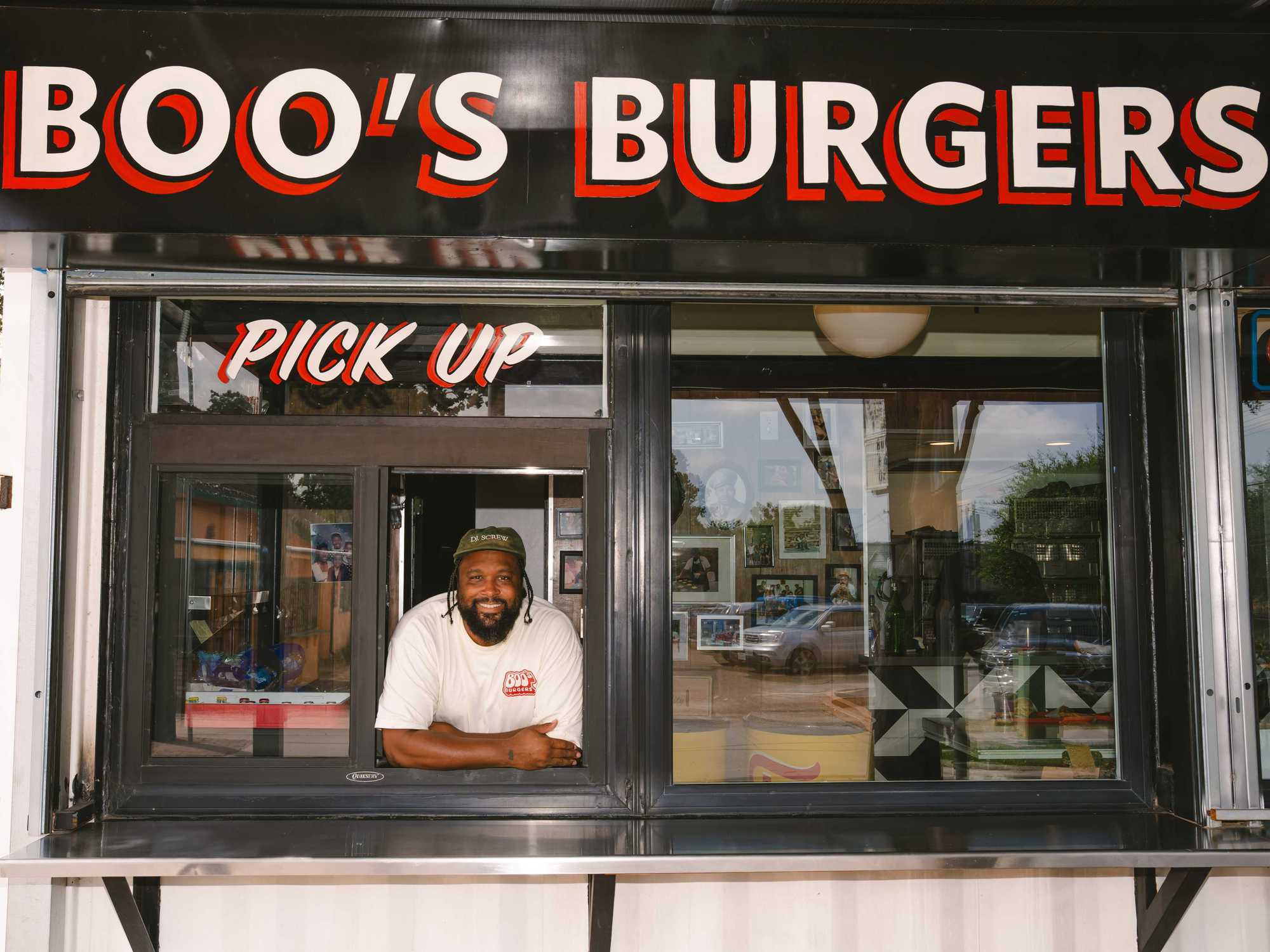 Boo's Burgers chef-owner Joseph Boudreaux is a Rising Star nominee. Photo by Michael Anthony
Boo's Burgers chef-owner Joseph Boudreaux is a Rising Star nominee. Photo by Michael Anthony